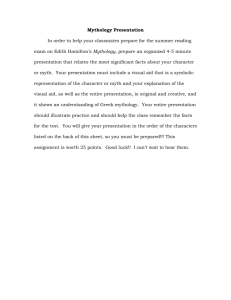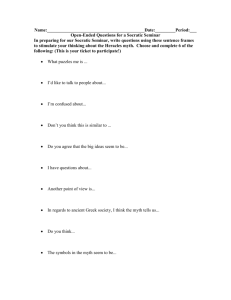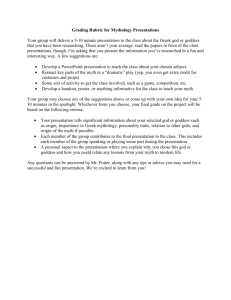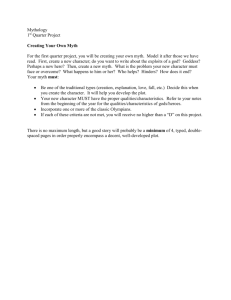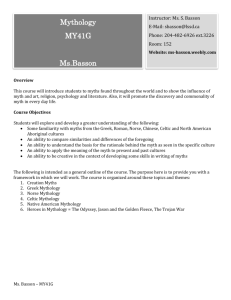ENG 250 - Clackamas Community College
advertisement
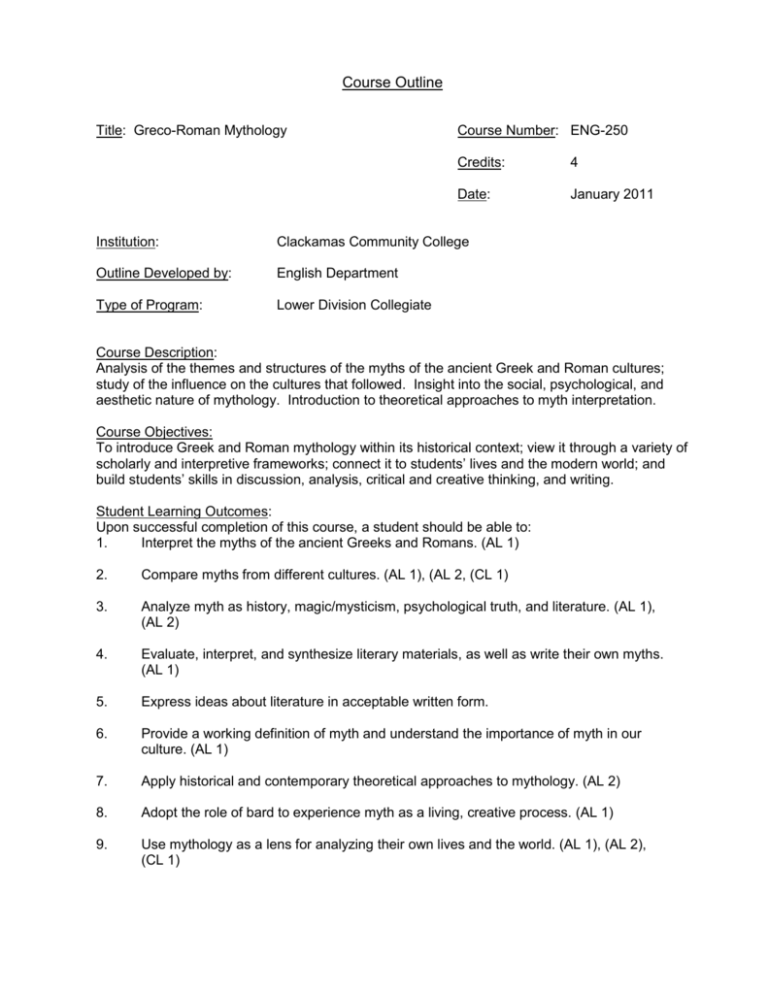
Course Outline Title: Greco-Roman Mythology Course Number: ENG-250 Credits: 4 Date: January 2011 Institution: Clackamas Community College Outline Developed by: English Department Type of Program: Lower Division Collegiate Course Description: Analysis of the themes and structures of the myths of the ancient Greek and Roman cultures; study of the influence on the cultures that followed. Insight into the social, psychological, and aesthetic nature of mythology. Introduction to theoretical approaches to myth interpretation. Course Objectives: To introduce Greek and Roman mythology within its historical context; view it through a variety of scholarly and interpretive frameworks; connect it to students’ lives and the modern world; and build students’ skills in discussion, analysis, critical and creative thinking, and writing. Student Learning Outcomes: Upon successful completion of this course, a student should be able to: 1. Interpret the myths of the ancient Greeks and Romans. (AL 1) 2. Compare myths from different cultures. (AL 1), (AL 2, (CL 1) 3. Analyze myth as history, magic/mysticism, psychological truth, and literature. (AL 1), (AL 2) 4. Evaluate, interpret, and synthesize literary materials, as well as write their own myths. (AL 1) 5. Express ideas about literature in acceptable written form. 6. Provide a working definition of myth and understand the importance of myth in our culture. (AL 1) 7. Apply historical and contemporary theoretical approaches to mythology. (AL 2) 8. Adopt the role of bard to experience myth as a living, creative process. (AL 1) 9. Use mythology as a lens for analyzing their own lives and the world. (AL 1), (AL 2), (CL 1) Length of Course: 44 lecture hours Grading Method: Letter grade (A-F) or Pass/No Pass Prerequisites: None Recommended: Pass RD-090 or placement in RD-115; pass WR-095 or placement in WR-121 Major Topic Outline: The origins and development of Greek myth Cultural background of Greek and Roman myth Myths of creation Male deities, female deities The great houses The hero in myth The sources of Greco-Roman myth: Homer: The Iliad and The Odyssey Hesiod: Theogony and Works and Days Homeric Hymns Vergil: The Aeneid Ovid: Metamorphoses Myth Theory The legacy Mythology as a lens for viewing one’s own life and the world. CCC AAOT/ASOT GENERAL EDUCATION OUTCOMES COURSE OUTLINE MAPPING CHART Course Title and Number: ENG-250 Greco-Roman Mythology Mark outcomes addressed by this course: Mark “C” if this course completely addresses the outcome. Students who successfully complete this course are likely to have attained this learning outcome. Mark “S” if this course substantially addresses the outcome. More than one course is required for the outcome to be completely addressed. Students who successfully complete all of the required courses are likely to have attained this learning outcome. Mark “P” if this course partially addresses the outcome. Students will have been exposed to the outcome as part of the class, but the class is not a primary means for attaining the outcome and assessment for general education purposes may not be necessary. As a result of completing the AAOT /ASOT general education requirements, students will be able to: WR: Writing Outcomes 1. Read actively, think critically, and write purposefully and capably for academic and, in some cases, professional audiences. 2. Locate, evaluate, and ethically utilize information to communicate effectively. 3. Demonstrate appropriate reasoning in response to complex issues. SP: Speech/Oral Communication Outcomes 1. Engage in ethical communication processes that accomplish goals. 2. Respond to the needs of diverse audiences and contexts. 3. Build and manage relationships. MA: Mathematics Outcomes 1. Use appropriate mathematics to solve problems. 2. Recognize which mathematical concepts are applicable to a scenario, apply appropriate mathematics and technology in its analysis, and then accurately interpret, validate, and communicate the results. AL: Arts and Letters Outcomes i 1. Interpret and engage in the Arts & Letters, making use of the creative process to enrich the quality of life. 2. Critically analyze values and ethics within a range of human experience and expression to engage more fully in local and global issues. SS: Social Science Outcomes 1. Apply analytical skills to social phenomena in order to understand human behavior. 2. Apply knowledge and experience to foster personal growth and better appreciate the diverse social world in which we live. SC: Science or Computer Science Outcomes 1. Gather, comprehend, and communicate scientific and technical information in order to explore ideas, models, and solutions and generate further questions. 2. Apply scientific and technical modes of inquiry, individually, and collaboratively, to critically evaluate existing or alternative explanations, solve problems, and make evidence-based decisions in an ethical manner. 3. Assess the strengths and weaknesses of scientific studies and critically examine the influence of scientific and technical knowledge on human society and the environment. CL: Cultural Literacy Outcome ii 1. Identify and analyze complex practices, values, and beliefs and the culturally and historically defined meanings of difference. IL: Information Literacy Outcomesiii 1. Formulate a problem statement. 2. Determine the nature and extent of the information needed to address the problem. 3. Access relevant information effectively and efficiently. 4. Evaluate information and its course critically. 5. Understand many of the economic, legal, and social issues surrounding the use of information. “Arts and Letters” refers to works of art, whether written, crafted, designed, or performed and documents of historical or cultural significance. ii Must be embedded in a course that meets the outcomes for Arts and Letters, Social Science, or Science/Computer Science. iii Must be embedded in the general education required Writing courses Revised 2010-2011 to reflect Statewide AAOT outcomes i S S S
